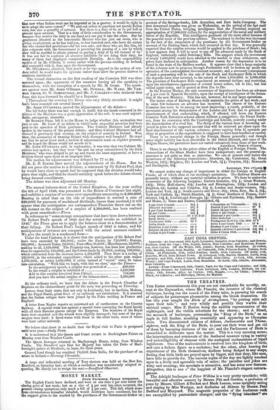' The annual balance-sheet of the United Kingdom, for the
year ending the 6th of April 1846, was presented to the House of Commons last night, and exhibits a surplus of revenue over expenditure amounting to 2,380,6001. Bearing in mind that on the side of expenditure is entered a sum of 228,0001. for payment of unclaimed dividends, (more than received,) it will appear that the anticipation our correspondent Financier threw out on the 4th instant on the subject of a surplus of 2,500,0001., has been realized with great exactitude.—Times.
In reference to " some strange comparisons that have been drawn between Sir Robert Peel's speech of 1845 and the actual results as exhibited in 1846," the Times goes on to apply the balance-sheet to a demonstration of their fallacy. Sir Robert Peel's budget speech of 1845 is taken, and his anticipations of revenue are compared with the actual amounts realized. We give the result in a condensed form— Under the head Customs, it is shown that the anticipations of Sir Robert Peel have been exceeded by 186,0001.; under the Excise, by 716,0001.; Stamps, 560,0001.; Assessed Taxes, 24,0001.; Post-office, 91,0001.; Miscellaneous, 53,0001.; making in all, 1,630,0001. The Property-tax, however, has been less productive than he expected by 116,0001., and the Crown-lands by 20,0001., making 136,0001.; which subtracted from the increase leaves 1494,0001. Then there is a saving of 132,0001., in the estimated expenditure; which added to the other gain makes 1,626,0001, or rather 1,630,0001. if entire instead of "round" sums be taken into calculation. "With this we begin, with this we close," says the Times—
In the anticipatory speech, a surplus was promised of £90,000 In the result a surplus is exhibited of . 1,630,000 Add to this surplus (received from China) 750,000 And you have the actual surplus of the balance-sheet 2,380,000


























 Previous page
Previous page